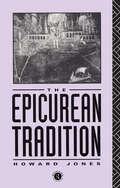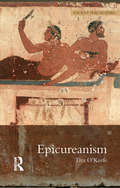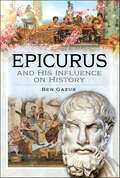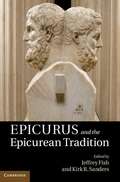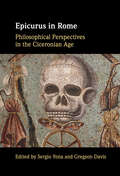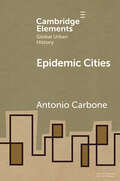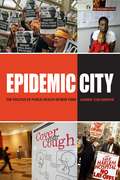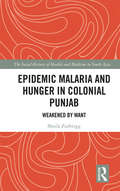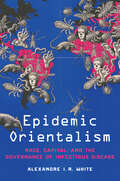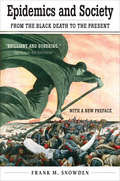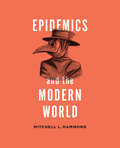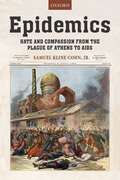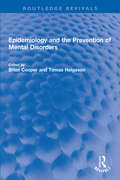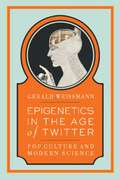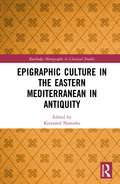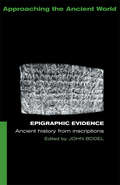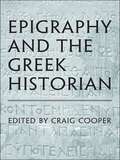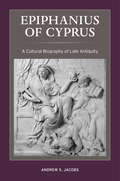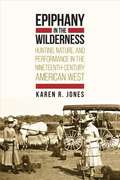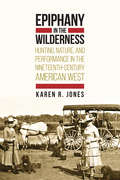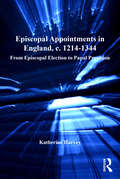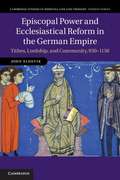- Table View
- List View
Epicurean Tradition
by Howard JonesFirst published in 1992. Routledge is an imprint of Taylor & Francis, an informa company.
Epicureanism (Ancient Philosophies #7)
by Tim O'KeefeThe Epicurean school of philosophy was one of the dominant philosophies of the Hellenistic period. Founded by Epicurus of Samos (century 341-270 BCE) it was characterized by an empiricist epistemology and a hedonistic ethics. This new introduction to Epicurus offers readers clear exposition of the central tenets of Epicurus' philosophy, with particular stress placed on those features that have enduring philosophical interest and where parallels can be drawn with debates in contemporary analytic philosophy. Part 1 of the book examines the fundamentals of Epicurus' metaphysics, including atoms and the void, emergent and sensible properties, cosmology, mechanistic biology, the nature and functioning of the mind, death, and freedom of action. Part 2 explores Epicurus' epistemology, including his arguments against scepticism and his ideas on sensations, preconceptions and feelings. The final part deals with Epicurus' ethics, exploring his arguments for hedonism, his distinctive conceptions of types of pleasure and desire, his belief in virtue, his notions of justice, friendship and his theology. O'Keefe provides extended exegesis of the arguments supporting Epicurus' positions, indicating their strengths and weaknesses, while showing the connections between the various parts of his philosophy and how Epicureanism hangs together as a whole.
Epicureans and Atheists in France, 1650–1729
by Alan Charles KorsAtheism was the most foundational challenge to early-modern French certainties. Theologians and philosophers labelled such atheism as absurd, confident that neither the fact nor behaviour of nature was explicable without reference to God. The alternative was a categorical naturalism, whose most extreme form was Epicureanism. The dynamics of the Christian learned world, however, which this book explains, allowed the wide dissemination of the Epicurean argument. By the end of the seventeenth century, atheism achieved real voice and life. This book examines the Epicurean inheritance and explains what constituted actual atheistic thinking in early-modern France, distinguishing such categorical unbelief from other challenges to orthodox beliefs. Without understanding the actual context and convergence of the inheritance, scholarship, protocols, and polemical modes of orthodox culture, the early-modern generation and dissemination of atheism are inexplicable. This book brings to life both early-modern French Christian learned culture and the atheists who emerged from its intellectual vitality.
Epicurus and His Influence on History
by Ben GazurHow should we live? In ancient Greece one man came up with a pleasingly simple answer to this question. The philosopher Epicurus taught his followers that pleasure and contentment were the aims of the good life. For hundreds of years Epicureanism was one of the dominant schools of philosophy. But by the 6th century it had all but disappeared. Discovering how and why Epicureanism was driven from philosophy and public discourse reveals much about how Western thought developed. Despite attempts to erase him, the lessons of Epicurus have been recovered from the mists of time and the ashes of Vesuvius. How he was restored to his place in history is a story of brilliant Renaissance scholars, chance discoveries, and a hunger for intellectual freedom. This new biography of Epicurus reveals the life of Epicurus and traces how his teachings have influenced thinkers across time. Epicurus still has much to teach us about friendship, happiness, and our place in the world.
Epicurus and the Epicurean Tradition
by Kirk R. Sanders Jeffrey FishEpicureanism after the generation of its founders has been characterised as dogmatic, uncreative and static. But this volume brings together work from leading classicists and philosophers that demonstrates the persistent interplay in the school between historical and contemporary influences from outside the school and a commitment to the founders' authority. The interplay begins with Epicurus himself, who made arresting claims of intellectual independence, yet also admitted to taking over important ideas from predecessors, and displayed more receptivity than is usually thought to those of his contemporaries. The same principles of autonomy and openness figure importantly in the three major areas of focus in these essays: theology, politics and the emotions.
Epicurus in Rome: Philosophical Perspectives in the Ciceronian Age
by Gregson Davis Sergio YonaThe role of Greek thought in the final days of the Roman republic is a topic that has garnered much attention in recent years. This volume of essays, commissioned specially from a distinguished international group of scholars, explores the role and influence of Greek philosophy, specifically Epicureanism, in the late republic. It focuses primarily (although not exclusively) on the works and views of Cicero, premier politician and Roman philosopher of the day, and Lucretius, foremost among the representatives and supporters of Epicureanism at the time. Throughout the volume, the impact of such disparate reception on the part of these leading authors is explored in a way that illuminates the popularity as well as the controversy attached to the followers of Epicurus in Italy, ranging from ethical and political concerns to the understanding of scientific and celestial phenomena.
Epicurus in Rome: Philosophical Perspectives in the Ciceronian Age
by Gregson Davis Sergio YonaThe role of Greek thought in the final days of the Roman republic is a topic that has garnered much attention in recent years. This volume of essays, commissioned specially from a distinguished international group of scholars, explores the role and influence of Greek philosophy, specifically Epicureanism, in the late republic. It focuses primarily (although not exclusively) on the works and views of Cicero, premier politician and Roman philosopher of the day, and Lucretius, foremost among the representatives and supporters of Epicureanism at the time. Throughout the volume, the impact of such disparate reception on the part of these leading authors is explored in a way that illuminates the popularity as well as the controversy attached to the followers of Epicurus in Italy, ranging from ethical and political concerns to the understanding of scientific and celestial phenomena. This title is also available as Open Access on Cambridge Core.
Epidemic Cities (Elements in Global Urban History)
by Antonio CarboneEpidemic Cities provides an overview of the history of epidemics through a particular focus on a range of cities in different regions of the world. The dual focus on both epidemics and specific cities provides an unusual perspective on global history: the analysis of globally circulating epidemics enables reconstructing a variety of wide-reaching entanglements, on the one hand. On the other hand, the concentration with specific urban settings highlights differences and the unevenness engendered by global entanglements. After an introduction concerning the history of the relationship between medicine, epidemics, and cities, the book focuses on the history of three epidemic diseases and how they affected Paris, Buenos Aires, Hong Kong, Bombay, and Baltimore. The timings of major pandemics punctuate the structure of the book: cholera pandemics from the 1830s to the late nineteenth century, bubonic plague at the turn of the twentieth century, and finally tuberculosis until the mid-twentieth century.
Epidemic City: The Politics of Public Health in New York
by James ColgroveAn insightful chronicle of the changing public health demands in New York City. The first permanent Board of Health in the United States was created in response to a cholera outbreak in New York City in 1866. By the mid-twentieth century, thanks to landmark achievements in vaccinations, medical data collection, and community health, the NYC Department of Health had become the nation’s gold standard for public health. However, as the city’s population grew in number and diversity, the department struggled to balance its efforts between the treatment of diseases—such as AIDS, tuberculosis, and West Nile Virus—and the prevention of illness-causing factors like lead paint, heroin addiction, homelessness, smoking, and unhealthy foods. In Epidemic City, historian of public health James Colgrove chronicles the challenges faced by the health department since New York City’s mid-twentieth-century “peak” in public health provision. This insightful volume draws on archival research and oral histories to examine how the provision of public health has adapted to the competing demands of diverse public needs, public perceptions, and political pressure. Epidemic City analyzes the perspectives and efforts of the people responsible for the city’s public health from the 1960s to the present—a time that brought new challenges, such as budget and staffing shortages, and new threats like bioterrorism. Faced with controversies such as needle exchange programs and AIDS reporting, the health department struggled to maintain a delicate balance between its primary focus on illness prevention and the need to ensure public and political support for its activities. In the past decade, after the 9/11 attacks and bioterrorism scares partially diverted public health efforts from illness prevention to threat response, Mayor Michael Bloomberg and Health Commissioner Thomas Frieden were still able to pass New York’s Clean Indoor Air Act restricting smoking and significant regulations on trans-fats used by restaurants. This legislation—preventative in nature much like the department’s original sanitary code—reflects a return to the nineteenth century roots of public health, when public health measures were often overtly paternalistic. The assertive laws conceived by Frieden and executed by Bloomberg demonstrate how far the mandate of public health can extend when backed by committed government officials. Epidemic City provides a compelling historical analysis of the individuals and groups tasked with negotiating the fine line between public health and political considerations. By examining the department’s successes and failures during the ambitious social programs of the 1960s, the fiscal crisis of the 1970s, the struggles with poverty and homelessness in the 1980s and 1990s, and in the post-9/11 era, Epidemic City shows how the NYC Department of Health has defined the role and scope of public health services for the entire nation.
Epidemic Malaria and Hunger in Colonial Punjab: Weakened by Want (The Social History of Health and Medicine in South Asia)
by Sheila ZurbriggThis book documents the primary role of acute hunger (semi- and frank starvation) in the ‘fulminant’ malaria epidemics that repeatedly afflicted the northwest plains of British India through the first half of colonial rule. Using Punjab vital registration data and regression analysis it also tracks the marked decline in annual malaria mortality after 1908 with the control of famine, despite continuing post-monsoonal malaria transmission across the province. The study establishes a time-series of annual malaria mortality estimates for each of the 23 plains districts of colonial Punjab province between 1868 and 1947 and for the early post-Independence years (1948-60) in (East) Punjab State. It goes on to investigate the political imperatives motivating malaria policy shifts on the part of the British Raj. This work reclaims the role of hunger in Punjab malaria mortality history and, in turn, raises larger epistemic questions regarding the adequacy of modern concepts of nutrition and epidemic causation in historical and demographic analysis. Part of The Social History of Health and Medicine in South Asia series, this book will be useful to scholars and researchers of colonial history, modern history, social medicine, social anthropology and public health.
Epidemic Orientalism: Race, Capital, and the Governance of Infectious Disease
by Alexandre I. WhiteFor many residents of Western nations, COVID-19 was the first time they experienced the effects of an uncontrolled epidemic. This is in part due to a series of little-known regulations that have aimed to protect the global north from epidemic threats for the last two centuries, starting with International Sanitary Conferences in 1851 and culminating in the present with the International Health Regulations, which organize epidemic responses through the World Health Organization. Unlike other equity-focused global health initiatives, their mission—to establish "the maximum protections from infectious disease with the minimum effect on trade and traffic"—has remained the same since their founding. Using this as his starting point, Alexandre White reveals the Western capitalist interests, racism and xenophobia, and political power plays underpinning the regulatory efforts that came out of the project to manage the international spread of infectious disease. He examines how these regulations are formatted; how their framers conceive of epidemic spread; and the types of bodies and spaces it is suggested that these regulations map onto. Proposing a modified reinterpretation of Edward Said's concept of orientalism, White invites us to consider "epidemic orientalism" as a framework within which to explore the imperial and colonial roots of modern epidemic disease control.
Epidemics and Society: From the Black Death to the Present (The Open Yale Courses Series)
by Frank M. SnowdenA wide-ranging study that illuminates the connection between epidemic diseases and societal change, from the Black Death to Ebola This sweeping exploration of the impact of epidemic diseases looks at how mass infectious outbreaks have shaped society, from the Black Death to today. In a clear and accessible style, Frank M. Snowden reveals the ways that diseases have not only influenced medical science and public health, but also transformed the arts, religion, intellectual history, and warfare. A multidisciplinary and comparative investigation of the medical and social history of the major epidemics, this volume touches on themes such as the evolution of medical therapy, plague literature, poverty, the environment, and mass hysteria. In addition to providing historical perspective on diseases such as smallpox, cholera, and tuberculosis, Snowden examines the fallout from recent epidemics such as HIV/AIDS, SARS, and Ebola and the question of the world’s preparedness for the next generation of diseases.
Epidemics and the Modern World
by Mitchell HammondEpidemics and the Modern World explores the relationships between epidemics and key themes in modern history. Our institutions, colonial structures, relationships to animals, and perceptions of suffering, sexuality, race, and disability have all shaped – and been shaped by – these significant medical events. This book uses "biographies" of epidemics such as plague, tuberculosis, and HIV/AIDS to explore the impact of disease on the development of modern societies from the fourteenth century to the present. Drawing on the most recent science of genetics, microbiology, and climatology, this text includes "Science Focus" boxes that discuss important scientific concepts and technologies. Structured workshop sections with engaging primary sources help readers develop skills of interpretation and gain knowledge of key historical events. Epidemics and the Modern World assumes no prior experience with the history of science or medicine and is accessible for undergraduate students, while its challenging approach to the history of the modern world will engage readers of all levels and all interests.
Epidemics: Hate and Compassion from the Plague of Athens to AIDS
by Samuel K. CohnBy investigating thousands of descriptions of epidemics reaching back before the fifth-century-BCE Plague of Athens to the distrust and violence that erupted with Ebola in 2014, Epidemics challenges a dominant hypothesis in the study of epidemics, that invariably across time and space, epidemics provoked hatred, blaming of the 'other', and victimizing bearers of epidemic diseases, particularly when diseases were mysterious, without known cures or preventive measures, as with AIDS during the last two decades of the twentieth century. <p><p> However, scholars and public intellectuals, especially post-AIDS, have missed a fundamental aspect of the history of epidemics. Instead of sparking hatred and blame, this study traces epidemics' socio-psychological consequences across time and discovers a radically different picture: that epidemic diseases have more often unified societies across class, race, ethnicity, and religion, spurring self-sacrifice and compassion.
Epidemiology and the Prevention of Mental Disorders (Routledge Revivals)
by Brian Cooper To 769 Mas HelgasonFirst published in 1989, Epidemiology and the Prevention of Mental Disorders examines the research undertaken into the methods for studying the occurrence of mental illness in populations during the twenty years prior to publication. The book explores the incidence and distribution of conditions such as schizophrenia, depression, alcoholism, addiction, and dementia across populations, and the risk factors with which they are associated. Taking a public health approach to the prevention of mental illness, the book reports on epidemiological research in psychiatry, emphasising its use in preventative terms, and making connections between its use in psychiatry and its use in other fields of medicine. It also comments on the development of psychiatric epidemiology as a public health discipline and draws attention to the implications of contemporary changes to biological and social environments on mental health. Epidemiology and the Prevention of Mental Disorders will appeal to those with an interest in the history of psychiatric epidemiology and mental health.
Epigenetics in the Age of Twitter
by Gerald WeissmannPop culture meets cutting-edge science in this one-volume introduction to the history of science and modern biology."[Weissmann] has emerged in the last three decades as America's most interesting and important essayist. He has achieved this status both epigenetically and through Twitter, word of mouth, so to speak. . . . Much like Susan Sontag, Weissmann likes being a contemporary, and does not feel shackled by tradition. . . . This book is a joy for the heart and instructive for the mind." -ERIC KANDEL, Nobel Laureate and author of In Search of Memory"Only a mind as nimble and well traveled as Gerald Weissmann's could see, never mind make and expound on, the connections between salamanders and Prohibition . . . white blood cells, Hollywood and erectile dysfunction . . . health care reform and Marie Antoinette . . . bacteria, the Equal Rights Amendment and the "Miracle on the Hudson." Better yet, Weissmann does so with wit and insight. A fascinating tour through history, science and pop culture." -MAX GOMEZ, MD, Emmy Award-winning WCBS-TV Medical Correspondent"Erudite energy leaps from this lively commingling of art, culture and science. . . . In each [essay], Weissmann finds links between research and elements of history and pop culture, which play off each other to illuminating effect. So US politician Sarah Palin pops up in a discussion of 'Marie Antoinette syndrome'. . . and the 'meltdown' of the mythical Icarus meets the nuclear version at the Fukushima Daiichi power plant in Japan." -NatureEpigenetics, which attempts to explain how our genes respond to our environment, is the latest twist on the historic nature vs. nurture debate. In addressing this and other controversies in contemporary science, Gerald Weissmann taps what he calls "the social network of Western Civilization," including the many neglected women of science: from the martyred Hypatia of Alexandria, the first woman scientist, to the Nobel laureates Marie Curie, Christiane Nüsslein-Volhard, and Elizabeth Blackburn, among other luminaries in the field. Always instructive and often hilarious, this is a one-volume introduction to modern biology, viewed through the lens of today's mass media and the longer historical tradition of the Scientific Revolution. Whether engaging in the healthcare debate or imagining the future prose styling of the scientific research paper in the age of Twitter, Weissmann proves to be one of our most incisive cultural critics and satirists.Gerald Weissmann is director of the Biotechnology Study Center at the New York University School of Medicine and editor-in-chief of the FASEB Journal. His essays and reviews have appeared in numerous publications worldwide, including the London Review of Books and New York Times Book Review.
Epigram, Art, and Devotion in Later Byzantium
by Ivan DrpićThis book explores the nexus of art, personal piety, and self-representation in the last centuries of Byzantium. Spanning the period from around 1100 to around 1450, it focuses upon the evidence of verse inscriptions, or epigrams, on works of art. Epigrammatic poetry, Professor Drpić argues, constitutes a critical - if largely neglected - source for reconstructing aesthetic and socio-cultural discourses that informed the making, use, and perception of art in the Byzantine world. Bringing together art-historical and literary modes of analysis, the book examines epigrams and other related texts alongside an array of objects, including icons, reliquaries, ecclesiastical textiles, mosaics, and entire church buildings. By attending to such diverse topics as devotional self-fashioning, the aesthetics of adornment, sacred giving, and the erotics of the icon, this study offers a penetrating and highly original account of Byzantine art and its place in Byzantine society and religious life.
Epigraphic Culture in the Eastern Mediterranean in Antiquity (Routledge Monographs in Classical Studies)
by Krzysztof NawotkaThis book investigates the epigraphic habit of the Eastern Mediterranean in antiquity, from the inception of alphabetic writing to the seventh c. CE, aiming to identify whether there was one universal epigraphic culture in this area or a number of discrete epigraphic cultures. Chapters examine epigraphic culture(s) through quantitative analysis of 32,062 inscriptions sampled from ten areas in the Eastern Mediterranean, from the Black Sea coast to Greece, western to central Asia Minor, Phoenicia to Egypt. They show that the shapes of the epigraphic curves are due to different factors occurring in different geographical areas and in various epochs, including the pre-Greek epigraphic habit, the moment of urbanization and Hellenization, and the organized Roman presence. Two epigraphic maxima are identified in the Eastern Mediterranean: in the third c. BCE and in the second c. CE. This book differs from previous studies of ancient epigraphic culture by taking into account all categories of inscriptions, not just epitaphs, and in investigating a much broader area over the broadly defined classical antiquity. This volume is a valuable resource for anyone working on ancient epigraphy, history or the cultures of the Eastern Mediterranean.
Epigraphic Evidence: Ancient History From Inscriptions (Approaching the Ancient World)
by John BodelEpigraphic Evidence is an accessible guide to the responsible use of Greek and Latin inscriptions as sources for ancient history. It introduces the types of historical information supplied by inscriptional texts and the methods with which they can be used. It outlines the limitations as well as the advantages of the different types of evidence covered. Epigraphic Evidence includes a general introduction, a guide to the arrangement of the standard corpora inscriptions and individual chapters on local languages and native cultures, epitaphs and the ancient economy amongst others.
Epigraphy and the Greek Historian
by Craig CooperEpigraphy is a method of inferring and analyzing historical data by means of inscriptions found on ancient artifacts such as stones, coins, and statues. It has proven indispensable for archaeologists and classicists, and has considerable potential for the study of ancient history at the undergraduate and graduate levels. Epigraphy and the Greek Historian is a collection of essays that explore various ways in which inscriptions can help students reconstruct and understand Greek History.In order to engage with the study of epigraphy, this collection is divided into two parts, Athens and Athens from the outside. The contributors maintain the importance of epigraphy, arguing that, in some cases, inscriptions are the only tools we have to recover the local history of places that stand outside the main focus of ancient literary sources, which are often frustratingly Athenocentric. Ideally, the historian uses both inscriptions and literary sources to make plausible inferences and thereby weave together the disconnected threads of the past into a connected and persuasive narrative. Epigraphy and the Greek Historian is a comprehensive examination of epigraphy and a timely resource for students and scholars involved in the study of ancient history.
Epiphanius of Cyprus: A Cultural Biography of Late Antiquity
by Andrew S. JacobsEpiphanius, Bishop of Constantia on Cyprus from 367 to 403 C.E., was incredibly influential in the last decades of the fourth century. Whereas his major surviving text (the Panarion, an encyclopedia of heresies) is studied for lost sources, Epiphanius himself is often dismissed as an anti-intellectual eccentric, a marginal figure of late antiquity. In this book, Andrew Jacobs moves Epiphanius from the margin back toward the center and proposes we view major cultural themes of late antiquity in a new light altogether. Through an examination of the key cultural concepts of celebrity, conversion, discipline, scripture, and salvation, Jacobs shifts our understanding of "late antiquity" from a transformational period open to new ideas and peoples toward a Christian Empire that posited a troubling, but ever-present, "otherness" at the center of its cultural production.
Epiphany in the Wilderness
by Karen R. Jones"Whether fulfilling subsistence needs or featured in stories of grand adventure, hunting loomed large in the material and the imagined landscape of the nineteenth-century West. Epiphany in the Wilderness explores the social, political, economic, and environmental dynamics of hunting on the frontier in three "acts," using performance as a trail guide and focusing on the production of a "cultural ecology of the chase" in literature, art, photography, and taxidermy.Using the metaphor of the theater, Jones argues that the West was a crucial stage that framed the performance of the American character as an independent, resourceful, resilient, and rugged individual. The leading actor was the all-conquering masculine hunter hero, the sharpshooting man of the wilderness who tamed and claimed the West with each provident step. Women were also a significant part of the story, treading the game trails as plucky adventurers and resilient homesteaders and acting out their exploits in autobiographical accounts and stage shows.Epiphany in the Wilderness informs various academic debates surrounding the frontier period, including the construction of nature as a site of personal challenge, gun culture, gender adaptations and the crafting of the masculine wilderness hero figure, wildlife management and consumption, memorializing and trophy-taking, and the juxtaposition of a closing frontier with an emerging conservation movement."
Epiphany in the Wilderness: Hunting, Nature, and Performance in the Nineteenth-Century American West
by Karen R. JonesWhether fulfilling subsistence needs or featured in stories of grand adventure, hunting loomed large in the material and the imagined landscape of the nineteenth-century West. Epiphany in the Wilderness explores the social, political, economic, and environmental dynamics of hunting on the frontier in three “acts,” using performance as a trail guide and focusing on the production of a “cultural ecology of the chase” in literature, art, photography, and taxidermy. Using the metaphor of the theater, Jones argues that the West was a crucial stage that framed the performance of the American character as an independent, resourceful, resilient, and rugged individual. The leading actor was the all-conquering masculine hunter hero, the sharpshooting man of the wilderness who tamed and claimed the West with each provident step. Women were also a significant part of the story, treading the game trails as plucky adventurers and resilient homesteaders and acting out their exploits in autobiographical accounts and stage shows. Epiphany in the Wilderness informs various academic debates surrounding the frontier period, including the construction of nature as a site of personal challenge, gun culture, gender adaptations and the crafting of the masculine wilderness hero figure, wildlife management and consumption, memorializing and trophy-taking, and the juxtaposition of a closing frontier with an emerging conservation movement. The University Press of Colorado gratefully acknowledges the generous support of the Charles Redd Center for Western Studies at Brigham Young University toward the publication of this book.
Episcopal Appointments in England, c. 1214–1344: From Episcopal Election to Papal Provision (Church, Faith and Culture in the Medieval West)
by Katherine HarveyIn 1214, King John issued a charter granting freedom of election to the English Church; henceforth, cathedral chapters were, theoretically, to be allowed to elect their own bishops, with minimal intervention by the crown. Innocent III confirmed this charter and, in the following year, the right to electoral freedom was restated at the Fourth Lateran Council. In consequence, under Henry III and Edward I the English Church enjoyed something of a golden age of electoral freedom, during which the king might influence elections, but ultimately could not control them. Then, during the reigns of Edward II and Edward III, papal control over appointments was increasingly asserted and from 1344 onwards all English bishops were provided by the pope. This book considers the theory and practice of free canonical election in its heyday under Henry III and Edward I, and the nature of and reasons for the subsequent transition to papal provision. An analysis of the theoretical evidence for this subject (including canon law, royal pronouncements and Lawrence of Somercote’s remarkable 1254 tract on episcopal elections) is combined with a consideration of the means by which bishops were created during the reigns of Henry III and the three Edwards. The changing roles of the various participants in the appointment process (including, but not limited to, the cathedral chapter, the king, the papacy, the archbishop and the candidate) are given particular emphasis. In addition, the English situation is placed within a European context, through a comparison of English episcopal appointments with those made in France, Scotland and Italy. Bishops were central figures in medieval society and the circumstances of their appointments are of great historical importance. As episcopal appointments were also touchstones of secular-ecclesiastical relations, this book therefore has significant implications for our understanding of church-state interactions during the thirteenth and fourteenth centu
Episcopal Power and Ecclesiastical Reform in the German Empire
by John EldevikFocusing on the way bishops in the eleventh century used the ecclesiastical tithe – church taxes – to develop or re-order ties of loyalty and dependence within their dioceses, this book offers a new perspective on episcopacy in medieval Germany and Italy. Using three broad case studies from the dioceses of Mainz, Salzburg and Lucca in Tuscany, John Eldevik places the social dynamics of collecting the church tithe within current debates about religious reform, social change and the so-called 'feudal revolution' in the eleventh century, and analyses a key economic institution, the medieval tithe, as a social and political phenomenon. By examining episcopal churches and their possessions not in institutional terms, but as social networks which bishops were obliged to negotiate and construct over time using legal, historiographical and interpersonal means, this comparative study casts fresh light on the history of early medieval society.
